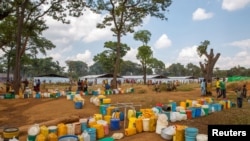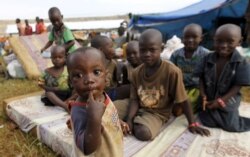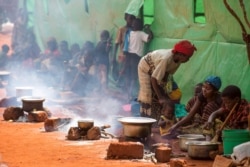VOA's BMJ Murithi and Frederic Nkundikije contributed to this report.
A deal to begin repatriating almost 200,000 Burundi refugees from Tanzania beginning in October has sparked anxiety among the displaced, with individuals considering an appeal to the United Nations and at least one civil society group weighing a lawsuit over any forced return.
"It is clear that the Tanzanian government, in collaboration with the Burundian government, wants to bring us back home by force," Renovat Nduwayo, a refugee at Nduta camp in western Tanzania, said of the repatriation pact between the two countries.
Tanzanian Interior Minister Kangi Lugola and his Burundi counterpart, Pascal Barandagiye, signed the agreement announced Sunday. As of October, it would return Burundi refugees at the rate of 2,000 a week from several camps in western Tanzania.
The latest figures from the U.N. Refugee Agency show almost 184,000 Burundi refugees in Tanzania, distributed among the Nduta, Mtendeli and Nyarugusu camps. They're among nearly 350,000 Burundians fleeing the small, Central-East African country's political unrest, which broke out after a controversial 2015 election giving President Pierre Nkurunziza a third term one enabling him to hold power until 2034.
Burundians also have sought refuge in other countries, primarily Rwanda, the Democratic Republic of Congo and Uganda.
Tanzania's Lugola said the agreement was negotiated after both country's governments were "satisfied with the security situation in Burundi."
But Nduwayo said refugees don't share that view.
"Most of us are not ready to return, because the security situation has not improved," Nduwayo told VOA in a phone interview Monday. He said he and other refugees monitoring news reports from Burundi continue to hear about "people being killed, some disappearing and some being arrested illegally."
Human Rights Watch alleged, in a June report, that Burundian authorities and youths affiliated with the ruling party "have carried out dozens of beatings, arbitrary arrests, disappearances and killings against real and suspected political opposition members."
If Tanzania's government forces Burundi refugees to leave, Nduwayo said he and others would ask the U.N. High Commissioner for Refugees (UNHCR) to relocate them to other East African countries, such as Rwanda, Uganda and Kenya.
The UNHCR has not issued any public statements about the Burundi-Tanzania deal.
Meanwhile, the Alliance of Burundi Lawyers for Victims of Human Rights Violations (CAVIB) is considering legal action.
Cyriaque Nibitegeka, a spokesperson, said members are "contemplating suing the Tanzanian government at international courts, specifically in the region."
Nibitegeka urged rights organizations "across the globe to work together in order to see to it that those Burundian refugees are not forcibly repatriated and are not constantly subjected to human rights violation and rape."
Burundi authorities have suspended both VOA and the BBC from operating in the country, and also have forbidden journalists from contributing to the news organizations.






